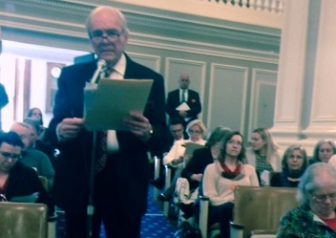CONCORD – Seacoast lawmakers are working with their North Country colleagues hoping to change the law to require a vote of approval by a municipality before a high voltage transmission line can be sited there.
Rep. Wayne Burton, D-Durham, Rep. Suzanne Smith, D-Hebron, Rep. Brad Bailey, R-Monroe and others co-sponsored House Bill 145 in response to two separate Eversource projects – the Seacoast Reliability Project and Northern Pass. The House Municipal and County Government Committee is expected to vote on it in two weeks after hearing testimony on Wednesday.
Rep. Bailey said his reasons for supporting the bill are simple.
“This piece of legislation will allow residents to have some form of local control over what comes through their communities,” Bailey said. It will also force corporations to address the concerns of local citizens, he said.
Bailey also said if the bill passes, he wants to make sure the law covers projects that have not yet been approved, including Northern Pass, Eversource’s controversial plan to bring hydropower from Hydro-Quebec along a 192-mile transmission line from Pittsburg to Deerfield.
Rep. Burton of Durham told the committee: “The question is, can we trust Eversource to practice due diligence that the project they are proposing will not cause long-term environmental damage.”
Burton was referring to the Seacoast project that is planned for 13 miles from Madbury to Portsmouth.
When Eversource made its presentation on the project in Dover, its representatives wouldn’t answer questions posed by citizens, Burton said. He also serves on the Durham Town Council, Oyster River Cooperative School District – Advisory Budget Committee, and the Strafford Regional Planning Commission.
“The law says that Eversource has to accept the questions at the forums. But they didn’t have to answer – and they didn’t. You can only imagine what the residents of Durham said to me after that …They were angry,” Burton said.
Eversource spokesperson Martin Murray did not respond to an email seeking comment about the bill or hearing testimony.
Municipalities have no final say over transmission projects. The state Site Evaluation Committee is responsible for approving or denying such projects. Durham has filed as an intervenor and hired a consultant to do its own environmental study, Burton said.
Burton is concerned that the project would damage the environment. Eversource’s website says additional transmission capacity is needed because demand is growing twice as fast on the Seacoast as the rest of the state.
He was also concerned that the meeting was moved at the last minute from the Legislative Office Building across the street to Representatives Hall at the last minute. Burton said Rep. Linda Massimilla, D-Littleton, had planned to testify, but missed the meeting because of the last-minute change.
Rep. Smith said the bill would protect towns from “being run roughshod over” by projects such as Northern Pass.
Eversource is required to hold public meetings where people can voice their opinions, she said. “But they are not binding referendums. Decisions do not need to be made based on people’s testimony,” Smith said.
She pointed to the town of Plymouth where Northern Pass has proposed tearing up Main Street to bury powerlines even though the town and businesses oppose the plan.
There’s been a lot of talk about how electric rates will go down, Smith said, but she believes any savings to the average family would be minimal.
Elizabeth Dragon, Franklin’s city manager, spoke against the bill.
“We oppose this bill,” Dragon said. “I’m very much in favor of communities having as much local control as possible. I truly appreciate the sentiments behind this bill.”
But sometimes, it’s just not practical, Dragon said.
“There is a need for some consistency across the state and some issues are simply broader than our local towns and cities,” Dragon said.
For instance, all communities must follow state fire codes and state directives when it comes to allowing mobile homes, Dragon said.
State law must pre-empt local control sometimes, she said, especially with transmission lines that may span many communities.
“It’s a matter of fairness to all residents across the board,” Dragon said.
Sen. Martha Fuller Clark, D-Portsmouth, is also a co-sponsor.
“It really has to do with making sure that the citizens of every community have the opportunity to weigh in when a project is proposed by a private business or corporation that has the potential to threaten their quality of life or economic value of that community,” Fuller Clark said.
Burton said the bill contains almost exactly the same language as 1974 legislation that ended Aristotle Onassis’ plan to build an oil refinery near Great Bay. It was the David and Goliath story of the day and the legislation passed then required a vote of approval before oil refineries could be built in any municipality. It was spearheaded by former Executive Councilor Dudley Dudley and three other women, Burton said.
“The language in HB 145 is the exact same language that was in that bill. We substituted ‘transmission lines’ for ‘oil refineries,’” Burton said. “That bill passed the House, the Senate and Gov. Meldrim Thomson let it pass into law without his signature.”
This bill is needed for exactly the same purpose, Burton said, to slow down the process and to level the playing field between small towns and big, well-funded corporations.

Nancy West photo
Rep. Wayne Burton, D-Durham
Eversource’s guide to Seacoast Reliability Project
Eversource’s guide to Northern Pass





